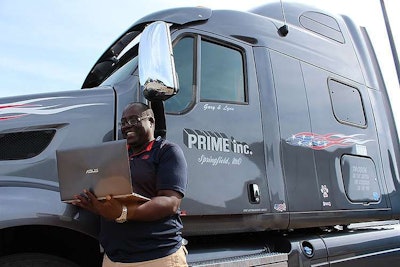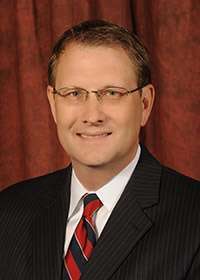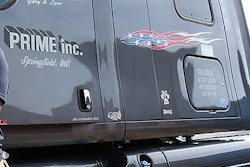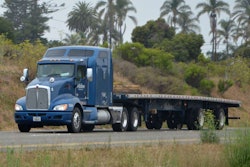 Through a partnership with Bethel University, drivers for Prime, Inc. can save 50 percent on tuition for online bachelor’s and master’s degree programs
Through a partnership with Bethel University, drivers for Prime, Inc. can save 50 percent on tuition for online bachelor’s and master’s degree programsSpending long days and nights away from home to earn a living has its trade-offs. For some careers, the upside might be opportunities to network and grow income – or at least to earn frequent-flier miles for a family vacation.
With hours-of-service restrictions, delays at delivery and receiving docks and other job frustrations, the trade-off for truck drivers might seem more like a dead end than a path to prosperity.
Prime, Inc. is trying diligently to change this perception or reality – whatever the case may be. While the Springfield, Mo.-based company has maintained an expanded list of career choices and opportunities to drivers, some of its most significant milestones have come this past year.
The career path for drivers begins with commercial driver’s license training. The Prime Student Driver program helped more than 1,300 people start a career in 2013 alone. Once students earn their CDL, they complete their training through a paid apprenticeship.
Besides helping to recruit drivers for Prime, the PSD program helps fulfill an essential need to bring more drivers into the industry, says John Hancock, director of driver training and recruiting. “There has to be more entrants into the business,” Hancock says. “This is part of our solution to it.”
The career path continues for new company drivers, who have an immediate opportunity to increase their income through a weekly pay-for-performance program. Drivers receive a weekly bonus if they meet the fleet’s criteria for fuel consumption, mileage, safety, compliance, customer service and other areas.
For the next stage, Prime offers the ability through a lease-purchase program to become an independent contractor; this allows them to accept a greater level of risk for an opportunity for greater independence and a chance at increased earnings potential. Being an owner-operator is the ultimate pay-for-performance package, Hancock says, since any gains in freight rates, fuel consumption, safety and productivity are immediately received.
 John Hancock, director of driver training and recruitment
John Hancock, director of driver training and recruitmentIndependent contractors, which comprise about 60 percent of Prime’s workforce of 6,300 drivers, are paid 72 percent of load revenue. They also get a fuel protection plan and are reimbursed for accessorial items such as toll costs. Prime gives its contractors the chance to obtain their own operating authority to become a partner carrier and build their own fleets.
Prime also has opportunities for drivers who decide to set their sights on a career in logistics and work inside the company walls, Hancock says.
Road scholars
Over-the-road drivers for Prime’s refrigerated, flatbed and tanker divisions also have the opportunity to advance their careers during their downtime.
The Prime Success Scholars Program was made possible by a large charitable donation to Bethel University by Robert Low, the company’s founder and president, and his mother. Through a corporate partnership, all Prime associates and their legal dependents can enroll in online and face-to-face degree programs from the fully accredited university.
Operators who enroll in online courses get a laptop or an iPad. For on-campus degrees, associates and their dependents have the choice to attend Bethel’s traditional campus in McKenzie, Tenn., or one of its satellite locations.
A few drivers signed up for online classes that began in fall 2013. Enrollment started off slowly, but Hancock says the interest level is high. He anticipates enrollments will increase among drivers and their dependents now that they have an affordable means to put themselves and their kids through college.
The program offers a 50 percent discount for online programs and a 40 percent discount for traditional on-campus programs. Students that attend an on-campus program also get a 40 percent discount on room and board.
The program especially is beneficial for military veterans who come to work for Prime. Veterans can earn their CDLs through the PSD program (funded by Prime) and save their GI Bill to pay for college rather than vocational driver training.
Prime covers the PSD cost in exchange for a time commitment from drivers. Veterans can use the living stipend portion of the GI Bill to supplement their income during the apprenticeship, Hancock says.
Alignment of interests
Just as drivers earn their living by the mile, all of Prime’s associates are paid by performance. The majority of employees’ hourly and salary pay structure is tied to their performance in weekly job measurements.
The pay structure for fleet managers is based on the productivity and profitability of their drivers and trucks. Each week, Prime generates a profit and loss (P&L) statement for each of the fleet groups. Managers are measured on the same criteria as their drivers – on-time service, accidents, cargo claims and compliance – as well as for driver retention.
Just as drivers feel the effects of a bad week in their wallets, managers’ incomes decline if they do not hit their numbers.
Corporate communication is essential for engaging drivers in their careers. Every Friday morning, Prime holds a meeting at its Springfield headquarters. Drivers receive a free breakfast and a chance to participate in an open mic forum.
“Open communications with drivers is critical,” Hancock says. “We want our entire company to take part, to be there, to care and to listen.”
The weekly meeting is streamed live to Prime’s other facilities and also is available online as a podcast.
The meeting format is to make announcements and discuss current trends in safety and operational issues, followed by a question and answer session. During the open mic portion, when a driver raises a specific issue such as safety or maintenance, the person in charge of that area responds.
“Sometimes it is not very comfortable,” Hancock says. “But having that communication in an open channel creates the right culture. It makes sense to be heard.”
Driver health and fitness
Another opportunity Prime gives its drivers is health and fitness training. This program began in 2012 when Siphiwe Baleka was hired as a driver fitness coach after completing his own lease truck program. Baleka carved out this role with his own success in battling weight as a Prime operator.
A former college athlete, Baleka experimented with different exercises that drivers could do in the cab and around the truck. While creating his “Baleka’s Fitness Trucking” DVD series sold at Prime’s onsite store, he approached Robert Low about a staff role.
“Making small changes now can prevent larger health issues in the future; it’s all about prevention,” Hancock says. “It may be the smartest thing we’ve ever done.”
Prime’s Driver Health and Fitness program is voluntary but has become part of its culture. In 2012, the company won the Truckload Carriers Association’s inaugural Weight Loss showdown. Last year, Baleka created Prime’s inaugural “Fittest of the Fleet” competition.
“I’d love to see a competition between fleets on something like this,” Hancock says. “Everyone loves to be a competitor or at least try.”
Hancock says industry colleagues often ask how Prime is able to do everything it does to improve driving careers. He says while Prime’s scale is larger than most, any fleet can encourage drivers to live a healthier lifestyle and help with recruiting and retention.
“We make our money one mile at a time like anyone else,” Hancock says.










